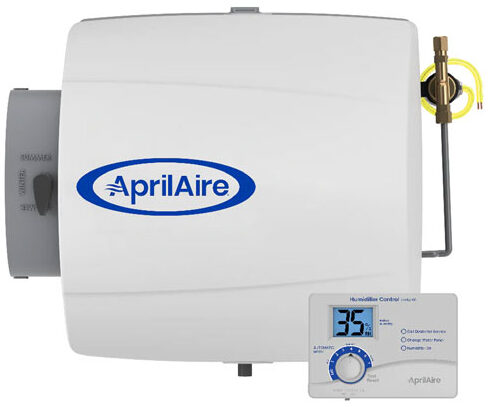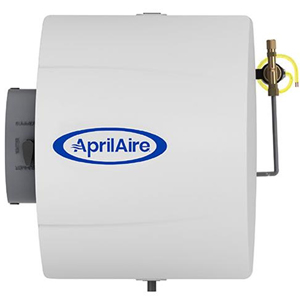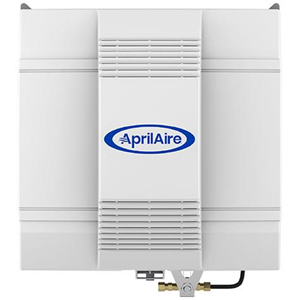Leonard Splaine Humidifiers in Northern Virginia
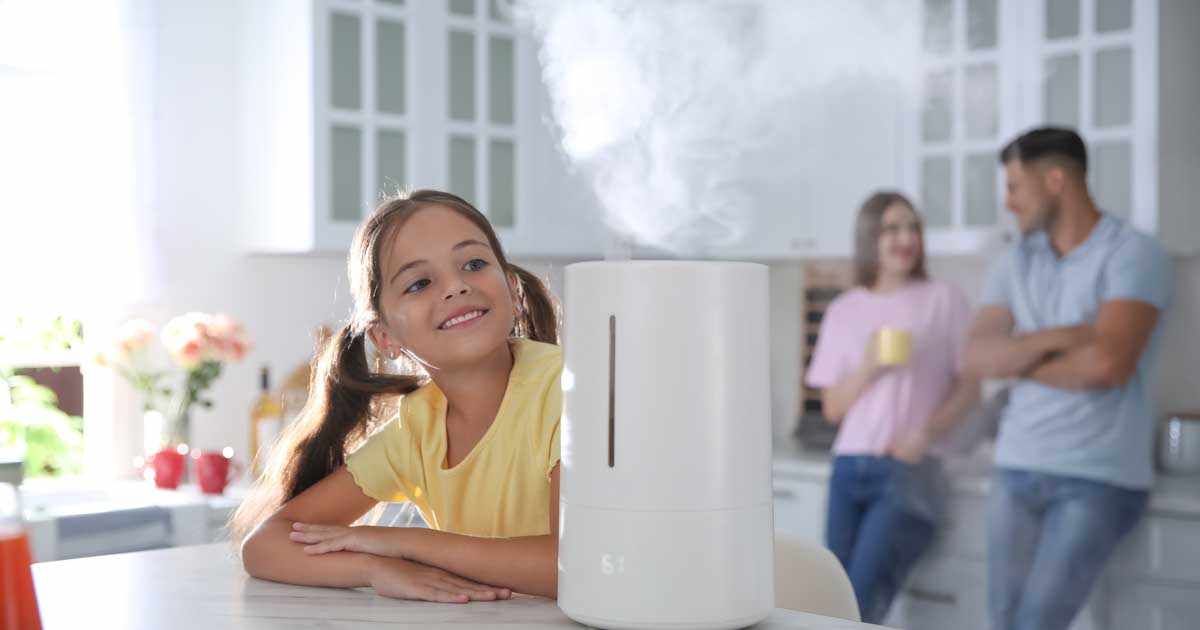
Humidifiers
How often do you think about the air you’re breathing? We usually will only give it a second’s thought if we smell or see something foreign to what we’re accustomed to. Allergens and pollution is not just an outdoor problem. The air we live in and breathe inside our homes and businesses can be even more contaminated than the air outside.
Heating systems are often blamed for the dryness of indoor air during winter, but the real culprit here is actually the cold weather. Winter brings about extremely arid air, causing discomforting issues like dry skin, sore throat, and an abundance of static electricity shock. Furthermore, the dry air can make it easier for viruses and bacteria to spread, leading to more cases of sickness.
A humidifier, according to the American Academy of Dermatology, can be beneficial in avoiding or alleviating these irritations. Additionally, the Food and Drug Administration mentions that a humidifier emitting cool air may help reduce nasal congestion and facilitate breathing during a cold. Furthermore, increased humidity can decrease static electricity, thereby avoiding those irritating shocks when walking on carpets.
What is a humidifier?
Humidifiers are devices that help keep you and your family comfortable by adding moisture to the indoor air to prevent dryness that can cause irritation in many parts of the body. They release water vapor or steam to increase moisture levels in the air even when the air outside is dry.
So what is the normal moisture level or humidity for a home?
Every home is different, the ideal relative humidity for health and comfort during winter is somewhere between 30-50% humidity, according to the Mayo Clinic. This means that the air holds between 30-50% of the maximum amount of moisture it can contain. In the summer, that level can be higher, between 50 and 60 per cent.
To determine your humidity levels, a device that is capable of measuring humidity is essential.
You may have a humidistat, which lets you monitor and control your home’s humidity level. Most humidistats are wired to a humidifier mounted right to your furnace, or they’re located on a wall elsewhere in your home.
Humidistats work in a similar way to thermostats, but instead of monitoring and changing temperatures accordingly, they measure the level of relative humidity in the air and switch on or off your humidifier depending on the reading. Most home furnaces don't have a dehumidifier setting and simply add humidity when needed. If your house is excessively humid, you may require a portable dehumidifier to take care of the problem.
Older wall humidistats tend to be imprecise in their readings. Fortunately, many modern smart thermostats feature a humidity level display (though they are unable to regulate it). An alternative is to purchase a hygrometer, an inexpensive device which can measure the moisture content of the air in your home, thus giving you the data you need to make any required adjustments.
Understanding humidity in your home can give you a picture of where you may have opportunities to make your place more energy efficient. With this knowledge, you can take the necessary steps to create an efficient environment for your entire home.
How to Tell if Your Home Has Poor Indoor Humidity
If you're feeling uncomfortable in your home, it could be a sign that your home's humidity level is too high. Signs that your home's moisture level is out of balance and affecting your wellbeing include dry skin, difficulty breathing, and a general feeling of malaise. To ensure that your home's air is perfectly balanced, it's important to maintain the correct level of humidity. Here are signs that your indoor humidity may be poor:
- If you are having difficulty getting a good night's sleep, consider the humidity level in the air around you. According to the National Sleep Foundation, too much or too little humidity can cause problems with sleep. When there is excess moisture in the air, your body has to work harder to cool itself by evaporating sweat, which can disrupt your ability to fall and stay asleep. On the other hand, when the air is too dry, it can irritate your throat and cause coughing fits.
- It can be draining and uncomfortable to constantly feel damp and sweaty when you're inside your house. You don't have the power to alter the humidity levels outside, however, you do have the ability to influence the atmosphere in your home.
- Having difficulty inhaling can often be caused by high indoor moisture levels, which can trigger asthma symptoms like chest constriction and wheezing. On the other hand, too low humidity levels can also bring about a variety of respiratory issues.
10 Benefits of Humidifiers
The use of a humidifier can be very advantageous from several aspects: it can improve health, reduce house maintenance costs, and be cost-effective. Specifically, it can offer improved comfort by positively influencing the health of those who use it. Here are some of the benefits of using humidifiers:
Prevent Colds and Flus
Raising the humidity of the air to 43 percent or higher has been demonstrated to decrease the capability of some airborne viruses that may cause illness, such as the flu. When the indoor humidity is below 23%, the flu's infectivity rate, or its ability to spread through airborne droplets, ranges from 70 to 77 percent. When the humidity level is kept at or above 43%, the rate decreases to between 14 and 22 percent. Therefore, using a humidifier inside your home can help stop the flu or cold from spreading.
Improve Skin
Generally, dry air has a detrimental effect on the skin, as it can draw out moisture and cause itching, irritation, dryness, and cracking. Humidifiers can help counteract this by adding moisture to the air, which can relieve discomfort, hydrate the skin, help it become softer and smoother, and restore its natural sheen. In a medical setting, raising the humidity from 32% to 43% with a humidifier during the winter has been proven to alleviate dry and itchy skin symptoms in personnel.
Help with Sinus and Congestion
Humidifiers can help to moisten the nasal passage and make it easier to clear congestion and soothe the vocal cords. When you are ill, the cells lining your respiratory tract produce more mucus which can dry and become hard to expel. Using a humidifier helps to keep the mucus from drying up and makes it less difficult to blow your nose or cough. Furthermore, if you suffer from sinusitis or other sinus conditions due to dry air, a humidifier can help reduce the severity of the symptoms.
Soothe a Sore Throat
Having a sore throat is a typical issue that can happen in the upper respiratory tract, with dry air being the main cause. Setting a humidifier in your sleeping area while you sleep can help to moisten the air and can be an effective way to get rid of sore throats.
Relieve Coughs
Humidifiers can help alleviate a cough caused by a contraction of the upper respiratory tract that is often brought on by dry air. Not only do they reduce the risk of airborne disease transmission, but they also soothe the muscles of the upper respiratory system, providing relief.
Reduce Allergies
Inhaling air with higher humidity levels can help alleviate the distress and symptoms of allergies. Symptoms such as nasal blockage, discomfort, and inflammation of nasal passages can be reduced by decreasing inflammation. With more moisture in the air, the nasal tissues can effectively expel potential irritants and allergens from the nasal cavity, hence relieving allergy symptoms. Nevertheless, too much humidity can cause dust mites and mould to propagate, so those who suffer from indoor allergies should clean their humidifiers regularly and continually monitor the humidity levels to ensure they do not exceed 50%.
Prevent Asthma
Asthma is a condition caused by the narrowing of the airways in the upper respiratory tract due to allergens, such as dirt, dust, pollen, and spores. Humidifiers can help reduce the effects of these asthma triggers by absorbing them, which in turn relaxes the airways and provides relief. They also help soothe the nasal and throat tissues, minimizing dryness, itching, coughing, nosebleeds, and sinus congestion.
Improve Sleep Quality
A dry atmosphere can make it really difficult to get a good night's sleep, resulting in insomnia or sleep deficiency due to the lack of humidity in the air. A humidifier can boost humidity levels and improve the quality of your sleep. In reality, humidifiers are often attached to CPAP (continuous positive airway pressure treatment) machines used on sleep apnea patients. Since CPAP machines blow dry air into the nostrils, which can lead to congestion, using heated humidification on sleep apnea patients has been found to reduce symptoms of nasal blockage and improve sleep quality.
Beneficial for House Plants
Humidifiers can be advantageous for more than just people; the moist air can be beneficial for home plants too. Plants need water from their soil and the air to stay alive and healthy. Dry air can lead to plants becoming withered, but a humidifier can provide the necessary moisture in the air. Additionally, indoor plants can also improve the air quality by producing additional oxygen that we can breathe in, which is beneficial to our bodies.
Improve Air Quality
Using a humidifier in a home can help to improve air quality significantly. Moist air is healthier to breathe, and doctors often recommend this as part of their treatment for respiratory illnesses and allergies. Dry air can make it hard to breathe, cause more frequent illnesses and make them last longer. Moreover, increased moisture from humidifiers can help with common symptoms such as dry skin, eyes, lips, and cracked furniture, floors, window sills, and peeling paint. Additionally, humidifiers can make furnaces in the winter more efficient as moist air feels warmer than dry air at the same temperature. It is important to note, however, that too much humidity can also lead to mold, so the key is to maintain moderate humidity levels with humidifiers.
Looking for a New Whole-House Humidifier or Need Humidifer Service?
Are you interested in a whole-house humidifier and how they can change your home or office environment for the better or do you need your humidifier repaired or serviced? Then give our team of experts at Leonard Splaine a call today. We will find the best solution for your needs!

The Risks of Too Much Humidity
Excess moisture in the air can be detrimental to your comfort, residence, possessions, and well-being. When the air is overly saturated with humidity, it inhibits your body's ability to adjust its internal temperature through sweat evaporation. A room with high humidity may feel warmer than one with lower humidity, even when both are at the same temperature.
Moreover, an excess of moisture in the air can be hazardous to your health. High humidity levels foster the propagation of fungi, mildew and dust mites, which can lead to breathing problems for those with asthma or allergies.
When it comes to your home, an atmosphere with too much moisture can be a breeding ground for mold and mildew, leading to costly damages. Over time, high humidity can lead to wood rotting, as well as attracting pests. Additionally, too much humidity can cause furniture and other items to swell, resulting in warping.
Types of Humidifiers
There are several types of humidifiers and it can be hard to decide what type of humidifier to buy based on your needs and budget, but we’re to help as we will go through some of the popular ones and their benefits.
Whole-House Humidifiers
Whole house humidifiers are capable of covering a large area, which is why they are not to be confused with point-of-use units that are attached to furnaces or HVAC systems. These larger units are more economical compared to adding a humidifier to your HVAC system. They come with large tanks, generally around 5 gallons, enabling you to go a few days between refills. However, it is important to remember to clean the tanks and unit once a week and replace the filters and wicks every three months. When using a whole house humidifier to cover two separate floors, it is better to have the unit on the upper floor as humid air is heavier than drier air. Additionally, it is recommended to use filtered, bottled or distilled water to avoid the “white dust” that humidifiers tend to produce.
AprilAire 500 Whole-House Small Bypass Evaporative Humidifier
We have decided to go with AprilAire 500 Whole-House Small Bypass Evaporative Humidifier. This HVAC-compatible, whole house humidifier is our top pick, because it’s a true “set it and forget it” model with minimum required maintenance. It is ideal for homes up to 3,000 square feet and measures about 16 x 13 inches, taking up only a bit of space among your duct work. While you can install this model yourself, it is a bit more complex than freestanding units. The installation kit is also sold separately. We recommend contacting a professional to install this unit, especially since it includes an outdoor temperature sensor, which requires a more advanced understanding of electrical work.
For larger homes, AprilAire Models 700 and 600 are top picks:
AprilAire Model 700 Fan-Powered Evaporative Humidifier
- Delivers up to 50% more moisture in comparison to competitive units
- Has an evaporation capacity of capacity of 18 gallons per day among the highest capacity for humidifiers on the market.
- Fan-powered, duct-mounted humidifier adds balanced humidity to your whole home, it humidifies tightly constructed homes, up to 5,300 square feet.
- Learn more: AprilAire Model 700 Fan-Powered Evaporative Humidifier
AprilAire Model 600 Large Bypass Evaporative Humidifier
- Delivers up to 50% more moisture in comparison to competitive units
- Has an evaporation capacity of 18 gallons per day
- Humidifies tightly-constructed homes up to 5,000 square feet in size
- Learn more: AprilAire Model 600 Large Bypass Evaporative Humidifier
- AprilAire 500 Whole-House Small ByPass Evaporative HUmidifier & Humidistat
- AprilAire Model 600 Large Bypass Evaporative Humidifier
- AprilAire Model 700 Fan-Powered Evaporative Humidifier
Warm Mist Humidifiers
Warm mist humidifiers generate a warm and pleasant mist that can be seen and felt. These humidifiers are useful for treating colds and flu, and usually make less noise than cool mist humidifiers. Also, the mist from warm mist humidifiers often is cleaner than the cool mist variety. However, warm mist humidifiers require regular cleaning and can be more difficult to clean than cool mist ones. They also usually cover a smaller area than their cool mist counterparts. Furthermore, since some of them generate hot steam, it is advisable to keep these humidifiers away from children. All in all, this is a great choice for providing soothing relief in a dry area with a bit of warmth at the same time.
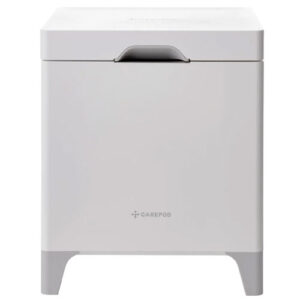
Carepod Cube X50 - Stainless Steel Warm + Cool Mist Humidifier
Our go-to warm mist humidifier is the Carepod Cube X50 - Stainless Steel Warm + Cool Mist Humidifier. This humidifier can provide a hydrating boost to up to 700 sq. ft., making it a top pick for living rooms and other large areas in the home. With the tank capacity that runs for up to 32 hours, the large humidifier is a must-have for around-the-clock climate control. On top of that, it comes with both warm and cool settings and is designed to use less energy (when compared to other warm mist humidifiers), making it a fantastic eco-friendly pick.
Cool Mist Humidifiers
Cool mist humidifiers emit an imperceptible vapor into the air, and often come with a filter that captures minerals and impurities. They are relatively easy to maintain and more effective in bigger rooms, as well as better in warmer climates. Some people think cool mist is more comfortable to breathe. However, compared to warm mist ones, cool mist humidifiers are noisier and require more maintenance with filters that need to be changed regularly to prevent the growth of algae and mold.
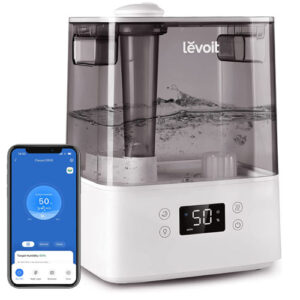
Levoit Classic 300S Smart Ultrasonic Cool Mist Humidifier
The Levoit Classic 300S Smart Ultrasonic Cool Mist Humidifier is our top choice for a cool mist humidifier. The brand claims this cool mist humidifier can last up to 60 hours on one tank set to the lowest mist levels, and it's quiet enough to run throughout the night. (It also has an optional built-in nightlight.) This machine can connect to an app or work with Amazon Alexa and Google Assistant for remote and hands-free controls, and offers scheduling options as well as auto mode to prompt it to adjust mist levels according to your desired humidity levels. The transparent tank can easily be refilled through a large opening at the top. Plus, if you want to use for aromatherapy, this humidifier also has a tray for essential oils.
Ultrasonic Humidifiers
Ultrasonic humidifiers employ a metal diaphragm that vibrates at an ultrasonic rate, akin to a loudspeaker. This produces water droplets that are dispersed into the atmosphere by a fan. These systems are typically nearly silent, and generate a cooling mist. As with whole home humidifiers, you may sometimes see 'white dust' with these units, but this can be avoided by using distilled, filtered or bottled water. Plus, they need less maintenance and are relatively easy to own and take care of.
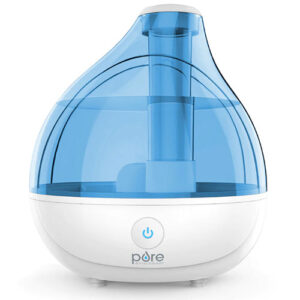
Pure Enrichment Mistaire Ultrasonic Cool Mist Humidifier
The Pure Enrichment Mistaire Ultrasonic Cool Mist Humidifier is our favorite ultrasonic humidifier, and favorite overall humidifier. With its compact design and shockingly quiet operation, you might forget you are using a humidifier. That's why the auto shut-off feature comes in handy when the water level is low or the tank is misaligned — in case you actually do forget. The one-button operation makes this humidifier very intuitive to use and its backlight makes it easy to see in the dark (in case you need to turn on the built-in night light or adjust the mist setting). While it may not be the easiest to clean since it has a medium-size tank opening, this humidifier comes with a cleaning brush to help make maintenance a little less arduous.

Our 100% Satisfaction Guarantee
We're so confident you'll find us to be a company you can rely on for all your heating and air conditioning needs that we guarantee your complete satisfaction! Contact us today and experience the difference for yourself.
Tips For Keeping Your Humidifier Clean
To keep humidifiers free of harmful mold and bacteria, follow the guidelines recommended by the manufacturer. These tips for portable humidifiers also can help:
Use distilled or demineralized water.
Tap water contains minerals that can create deposits inside your humidifier that promote bacterial growth. When released into the air, these minerals often appear as white dust on your furniture. It's also possible for you to breathe in some minerals that are spread into the air. Distilled or demineralized water has a much lower mineral content than does tap water. Also, use demineralization cartridges or filters if recommended by the manufacturer.
Change humidifier water often
Don't allow film or deposits to develop inside your humidifiers. Empty the tanks, dry the inside surfaces and refill with clean water every day if possible, especially if using cool-mist or ultrasonic humidifiers. Unplug the unit first.
Clean humidifiers every 3 days
Unplug the humidifier before you clean it. Remove any mineral deposits or film from the tank or other parts of the humidifier with a 3% hydrogen peroxide solution, which is available at pharmacies. Some manufacturers recommend using chlorine bleach or other disinfectants.
Always rinse the tank after cleaning. This can keep harmful chemicals from becoming airborne — and then inhaled.
Change humidifier filters regularly
If the humidifier has a filter, change it at least as often as the manufacturer recommends — and more often if it's dirty. Also, regularly change the filter in your central air conditioning and heating system.
Keep the area around humidifiers dry
If the area around a humidifier becomes damp or wet — including windows, carpeting, drapes or tablecloths — turn the humidifier down or reduce how often you use it.
Prepare humidifiers for storage
Drain and clean humidifiers before storing them. And then clean them again when you take them out of storage for use. Throw away all used cartridges, cassettes or filters.
Follow instructions for central humidifiers
If you have a humidifier built into your central heating and cooling system, read the instruction manual or ask your heating and cooling specialist about proper maintenance.
Consider replacing old humidifiers
Over time, humidifiers can build up deposits that are difficult or impossible to remove and encourage the growth of bacteria.
Contact Leonard Splaine, Your Local Humidifier Expert Today!
Humidifiers can be beneficial for those with dry skin and airways, however, it is important to use them with caution. Under no circumstances should a humidifier be considered a medical treatment, and if symptoms don't improve or seem to worsen, then one should immediately stop using it and contact their doctor.
At Leonard Splaine & Co, our expertise in humidifiers extends to helping Northern Virginians regulate the moisture levels in their homes. No matter the size of your residence, it is critical to keep the humidity at the right level. Low humidity can cause sore throats and dry skin, while too much humidity can result in mold and mildew build-up. We can make sure to provide you with a humidifier that is the correct size for your home and can repair any humidifier that is not functioning optimally.

We Are the Expert Solution to All Your HVAC & Home Comfort Needs
Take it from our customers: we solve problems and deliver solutions like no other HVAC company can. Contact us today!


